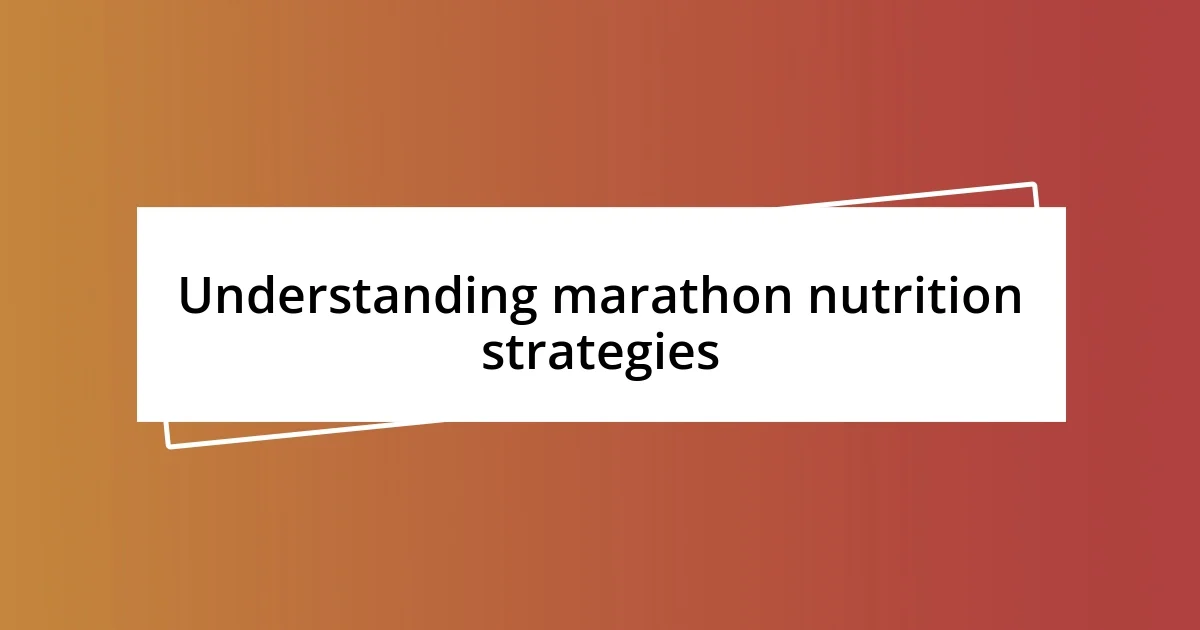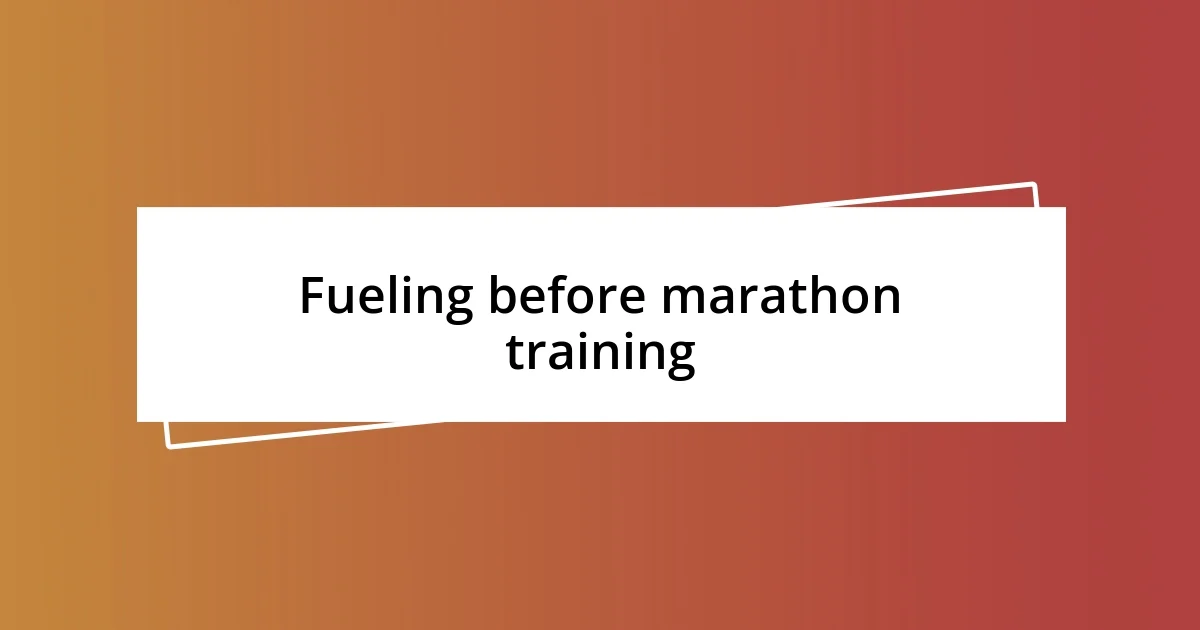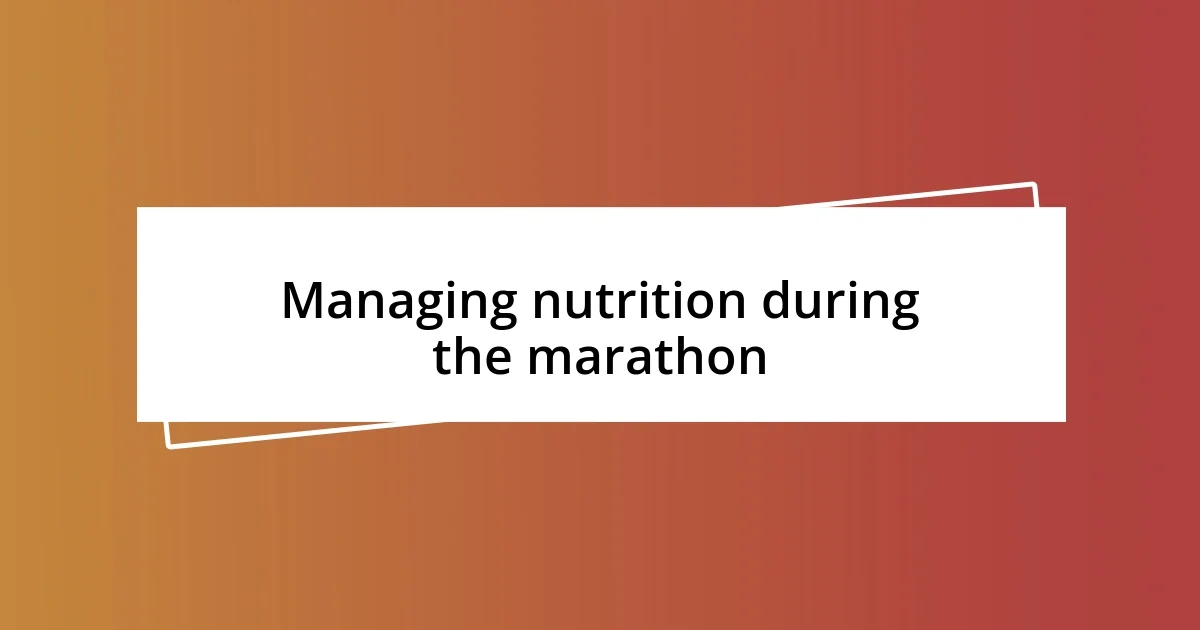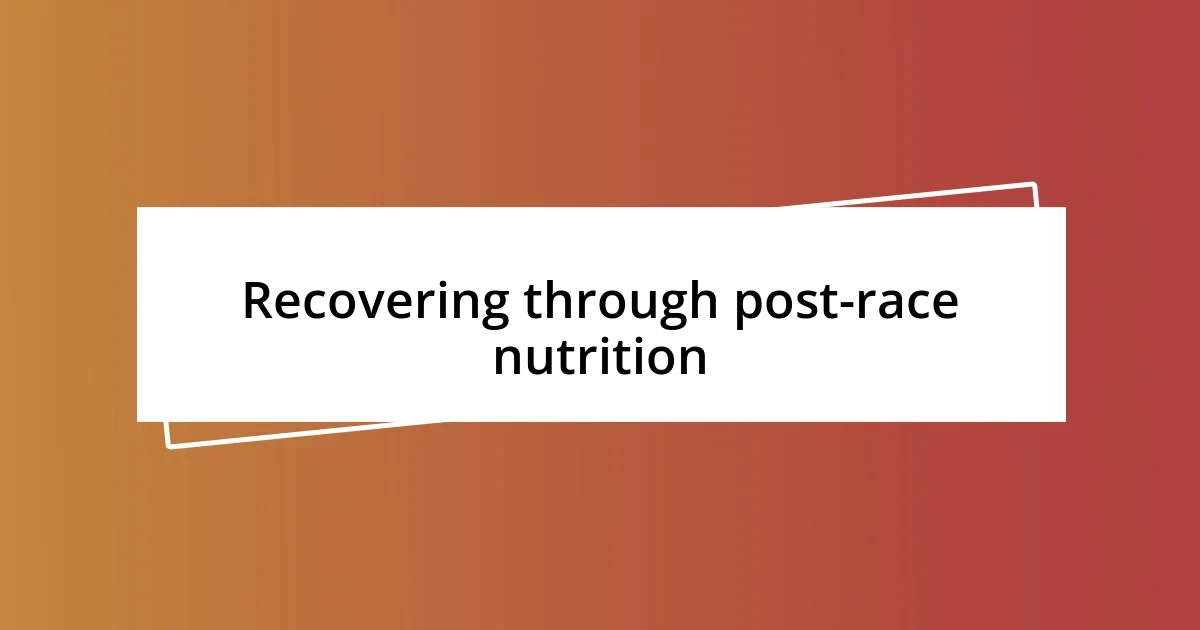Key takeaways:
- Personal experimentation with nutrition strategies, such as timing and food choices, is crucial for optimal marathon performance.
- Hydration and electrolyte intake significantly impact energy levels and endurance, and should be planned meticulously during training and races.
- Post-race nutrition, including a combination of proteins and carbs, along with proper hydration, is vital for effective recovery after intense efforts.

Understanding marathon nutrition strategies
When it comes to marathon nutrition strategies, I’ve learned that personal experimentation is crucial. During my first few long runs, I relied on typical energy gels, but I quickly realized that my stomach wasn’t always on board with that choice. Have you ever had that gut-wrenching moment mid-race? It’s a sinking feeling no runner wants to experience.
Through trial and error, I discovered that combining easy-to-digest carbs—like bananas or oatmeal—before a run worked wonders for me. The difference was phenomenal! Not only did I feel energized, but I avoided those stomach issues that had plagued my previous runs. It’s fascinating how even the smallest adjustments can drastically change your performance. Have you considered what fuels you during those long training sessions?
Another strategy I swear by is proper hydration—something I used to overlook. A particularly grueling training run taught me the hard way that dehydration can zap your energy and mental focus faster than you can say “finish line.” Now, I carry a water bottle on all my long runs and plan my hydration like clockwork. It’s amazing how understanding how much and when to hydrate can elevate your performance. What nutritional revelations have you encountered in your own journey?

Fueling before marathon training
Fueling before marathon training is a crucial step that I’ve come to appreciate deeply. Before my longer runs, I’ve discovered that it’s not just about what you eat, but when you eat it. On days I rushed my meals, I often felt sluggish and unfocused. A simple adjustment of enjoying a proper meal about 2-3 hours prior made all the difference. I remember one morning vividly when I savored a warm bowl of oatmeal topped with honey and berries. The energy it provided was nothing short of magical—I felt light and ready to hit the pavement.
Here’s a list of my go-to pre-training fuel options that have worked well for me:
- Oatmeal with a drizzle of honey and banana
- Whole grain toast with almond butter and a sprinkle of chia seeds
- Greek yogurt mixed with berries and a handful of granola
- Smoothies made with spinach, protein powder, and banana for an easy digest
- Rice cakes topped with peanut butter and sliced apples
In short, being mindful of how and when I fuel my body has transformed my training sessions. I’ve realized that a well-timed, hearty snack can truly set the tone for a successful run. Have you thought about your pre-run ritual yet?

Best foods for long runs
When it comes to powering through long runs, I’ve found that the right foods can make all the difference. For me, easily digestible carbohydrates are essential. I vividly remember a long run where I fueled up on dried fruit and nuts just before hitting the path. The burst of energy was incredible, and I felt like I could conquer the world. I learned that foods like sweet potatoes, quinoa, and low-fiber energy bars not only filled me up but also kept my energy levels stable throughout the run.
I also can’t stress enough the importance of protein. On days when I’ve included a bit of protein in my pre-run snacks, such as Greek yogurt or a protein shake, I noticed my recovery time improved significantly. Once, after a challenging training session, I devoured a homemade protein-packed smoothie, and it worked wonders. It helped me bounce back, ready for the next challenge. Remember, a balanced combination of carbs and protein can help keep you fueled and ready to tackle those long distances!
Here’s a quick comparison table of some of my favorite foods for long runs:
| Food | Benefits |
|---|---|
| Bananas | Quick energy, rich in potassium |
| Oatmeal | Slow-releasing carbs, easy to digest |
| Sweet potatoes | Nutritious carbs, supports recovery |
| Dried fruit | Fast energy boost, natural sugars |
| Greek yogurt | Protein for recovery, probiotics for gut health |

Hydration tips for runners
Hydration is often the unsung hero of marathon training, but it’s something I’ve learned to prioritize deeply. I remember one particularly grueling summer run when I neglected my hydration, and the feeling of fatigue hit hard. It was a brutal reminder that staying hydrated not only combats fatigue but also enhances my performance. I find that sipping water regularly, rather than chugging it all at once, keeps the body in a more balanced state.
I’ve adopted a routine of carrying a water bottle during my longer runs, which has been a game-changer. There’s something comforting about having that water just a reach away. Whenever I notice I’m getting fatigued, I take a moment to hydrate. It’s a simple strategy, but it has made my runs feel significantly smoother. Have you ever thought about how a small sip can revive your spirit on a challenging run? I surely have!
I also believe in the power of electrolytes. On those particularly hot days, I’ve learned to incorporate electrolyte drinks into my routine. The time I opted for a sports drink during a long 18-mile training run was eye-opening. The salty sweetness offered not just refreshment but a noticeable lift in my energy levels. It’s fascinating how the right balance of fluids can lead to more sustained energy and ultimately improve endurance. Have you experimented with different hydration strategies? It’s worthwhile to find what works best for you.

Pre-race meal planning
Pre-race meal planning requires thoughtful consideration of what fuels my body best. The night before a big race, I always make sure to enjoy a hearty dinner of whole grains and lean proteins. Just last month, I found myself relishing a bowl of brown rice topped with grilled chicken and steamed veggies. It was comforting and satisfying—exactly what I needed to wake up feeling light yet energised.
On race morning, my go-to meal consists of oatmeal topped with a drizzle of honey and sliced bananas. I still remember the nerves I felt before my first marathon. I forced down a big bowl, and as I waited at the starting line, I felt that familiar warmth in my belly—a sign I had made the right choice. I’ve learned that pre-race meals should be familiar; you want your body to know exactly how to react when it counts.
Timing also plays a crucial role in my pre-race preparation. I aim to eat three hours before the start, giving my body enough time to digest and utilize the fuel. It’s a delicate dance—too soon or too late can lead to discomfort on the course. Have you found what timing works best for you? Experimenting with different meal timings helped me discover what feels just right, ensuring I’m ready to hit my stride!

Managing nutrition during the marathon
Managing nutrition during the marathon is all about fine-tuning what works best for your body on race day. During my last marathon, I made it a point to refuel at every aid station, grabbing energy gels and occasional fruit slices. Would you believe that those quick bites of bananas not only tasted refreshing but gave me an instant boost when I hit the wall? It’s incredible how small amounts of easily digestible carbs can help maintain energy levels when fatigue creeps in.
I’ve also learned the importance of consistency in what I consume during the race. I always stick to the same gel every five miles, and I’ve found that peanut butter-flavored gels work for me like a charm. On a particularly challenging race day, I remember feeling a surge of relief every time I reached into my pocket for one. The familiar taste and texture made it so much easier to push through those tough miles. Have you established a favorite during-race snack, or are you still exploring options? It’s definitely worth experimenting to see what your body craves when fatigue sets in.
Finally, I’ve realized that it’s essential to listen to my body’s signals throughout the race. If I start feeling sluggish, I take a moment to check in with myself; do I need more fluid or fuel? There was a long stretch during my last race where I felt a dip in energy, and that prompted me to grab an extra gel. The immediate energy boost was unmistakable. How often do we truly take the time to assess our needs during a race? Taking a moment to assess and adjust can make a world of difference in maintaining that racing rhythm.

Recovering through post-race nutrition
Post-race nutrition plays a vital role in my recovery. Right after crossing the finish line, I reach for a combination of proteins and carbs—typically a chocolate milkshake or a protein bar. I remember the blissful feeling of downing that shake after my first marathon; it was almost as if every muscle in my body sighed in relief, thanking me for the nourishment.
One of the most effective strategies I’ve discovered involves consuming a well-rounded meal within 30 to 60 minutes post-race. I’ve often turned to a hearty bowl of quinoa salad filled with mixed veggies and grilled salmon. This combination not only replenishes my energy but also feels like a well-deserved treat after the hard work. Have you ever experienced that euphoric moment when you allow yourself to indulge in a favorite meal post-race? It’s as if the flavors taste even better because of the effort you put in during the race.
Hydration is equally important in my recovery strategy. I always make sure to hydrate with electrolyte drinks to help restore what I lost during the race. During one particularly grueling marathon, I learned the lessons of sipping and not chugging. I remember standing at one of the post-race tents, slowly sipping my drink while noticing how it settled my stomach and made every step to the car a little less painful. How do you approach your hydration? My experience has taught me that taking my time can make all the difference in feeling good after the race.














